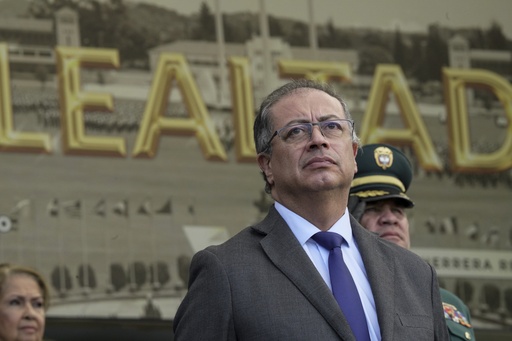President Donald Trump has paused plans to impose hefty tariffs on Colombia. The move comes after Colombia agreed to accept deported migrants transported on U.S. military planes, the White House revealed late Sunday night.
Earlier Sunday, Trump had threatened harsh actions against Colombia after it blocked U.S. deportation flights. He criticized the country’s refusal to allow military planes to transport migrants, calling the stance unacceptable.
Trump’s swift retaliation threat
The President announced multiple retaliatory measures on social media, promising a 25% tariff on Colombian goods entering the U.S. He warned that this rate would jump to 50% within a week if Colombia did not cooperate.
In addition to tariffs, Trump declared a travel ban and immediate visa revocations for Colombian officials and their allies. He also implemented visa sanctions targeting Colombian authorities and their families, along with stricter customs inspections on travelers and cargo from Colombia.
“These actions are just the beginning,” Trump posted on Truth Social. “We won’t let Colombia violate its legal obligations to accept the criminals they pushed into the U.S.!”
Colombia backs down
Late Sunday, White House Press Secretary Karoline Leavitt announced that Colombia had agreed to all U.S. demands. The agreement includes accepting deportees transported on military planes without delay or restriction.
Leavitt said, “The drafted tariffs and sanctions are on hold unless Colombia fails to honor this deal.” However, visa sanctions and enhanced customs inspections will remain until the first deportation flight is successfully completed.
Colombia’s response
Colombia’s Foreign Ministry confirmed the agreement and stated the country had “overcome the impasse” with the U.S. Officials said Colombia would ensure dignified conditions for returning deportees. However, their statement did not mention U.S. military planes. Instead, it said the Colombian presidential plane would be used to return migrants initially scheduled for deportation.
A senior Trump administration official dismissed the use of Colombia’s presidential plane, saying it wouldn’t meet Trump’s demands for lifting sanctions.
Petro’s bold defiance
Before the late-night deal, Colombian President Gustavo Petro openly challenged Trump’s threats. He dismissed the tariffs, saying, “Your blockade doesn’t scare me.” Petro vowed to impose a 50% tariff on U.S. goods in retaliation and mocked Trump’s travel ban, calling U.S. visits “boring.”
Petro even accused the U.S. of attempting to strong-arm Colombia. He warned, “Overthrow me, and the Americas and humanity will respond.”
U.S. stance on deportations
Secretary of State Marco Rubio defended Trump’s actions. He said Colombia had a duty to accept its deported citizens and accused Petro of canceling flight authorizations mid-air.
Rubio declared, “We’re committed to ending illegal immigration and protecting America’s borders.” The State Department confirmed sanctions on Colombian officials and their families for obstructing U.S. deportation operations.
Border crackdown intensifies
The U.S. Customs and Border Protection agency began enforcing travel bans and cargo inspections against Colombia on Sunday night. Colombian officials traveling with diplomatic visas were among those impacted.
Trump’s administration has escalated its immigration crackdown, deploying over 1,500 soldiers to the southern border. These troops assist in building barriers and operational support, although legal restrictions prevent them from enforcing immigration laws directly.
Military planes spark controversy
Colombia initially blocked deportation flights, arguing that transporting migrants on military planes treated them as criminals. President Petro demanded the U.S. use civilian aircraft instead.
Trump’s use of military planes follows a similar operation earlier in the week, where Guatemalan migrants were deported under the administration’s new mass deportation campaign.
What’s next?
The first deportation flight to Colombia under the new agreement is now crucial. If Colombia fails to follow through, Trump’s threatened tariffs and sanctions could still take effect.
The diplomatic standoff highlighted growing tensions between the two nations as Trump pushes forward with his hardline immigration policies.




